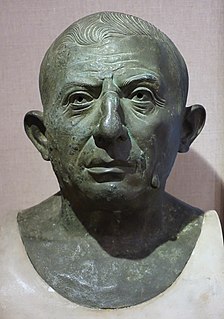Related Research Articles
The gens Tullia was a family at ancient Rome, with both patrician and plebeian branches. The first of this gens to obtain the consulship was Manius Tullius Longus in 500 BC, but the most illustrious of the family was Marcus Tullius Cicero, the statesman, orator, and scholar of the first century BC. The earliest of the Tullii who appear in history were patrician, but all of the Tullii mentioned in later times were plebeian, and some of them were descended from freedmen. The English form Tully, often found in older works, especially in reference to Cicero, is now considered antiquated.
Titus Pomponius Atticus was a Roman editor, banker, and patron of letters, best known for his correspondence and close friendship with prominent Roman statesman Marcus Tullius Cicero. Atticus was from a wealthy Roman family of the equestrian class and from the Pomponia gens.
Quintus Tullius Cicero was a Roman statesman and military leader, the younger brother of Marcus Tullius Cicero. He was born into a family of the equestrian order, as the son of a wealthy landowner in Arpinum, some 100 kilometres (62 mi) south-east of Rome.
Attica was the daughter of Cicero's Epicurean friend Titus Pomponius Atticus. She was also the first wife of Marcus Vipsanius Agrippa, close friend of the emperor Augustus.
Pomponia is the female name for the Pomponia gens of Ancient Rome. This family was one of the oldest families in Rome. Various women bearing this name lived during the Middle and Late Roman Republic and the Roman Empire. The oldest known Pomponia was mother of a famous Roman general; the second and third were related to each other. The relationship between these women, if any, is not known. They descended from Pomponius, the first son of Numa Pompilius, the second King of Rome.
The gens Quinctilia, also written Quintilia, was a patrician family at ancient Rome, dating from the earliest period of Roman history, and continuing well into imperial times. Despite its great antiquity, the gens never attained much historical importance. The only member who obtained the consulship under the Republic was Sextus Quinctilius in 453 BC. The gens produced numerous praetors and other magistrates, but did not obtain the consulship again for over four hundred years.

The personal life of Marcus Tullius Cicero provided the underpinnings of one of the most significant politicians of the Roman Republic. Cicero, a Roman statesman, lawyer, political theorist, philosopher, and Roman constitutionalist, played a critical role in the transformation of the Roman Republic into the Roman Empire. A contemporary of Julius Caesar, Cicero is widely considered one of Rome's greatest orators and prose stylists.

The gens Caecilia was a plebeian family at ancient Rome. Members of this gens are mentioned in history as early as the fifth century BC, but the first of the Caecilii who obtained the consulship was Lucius Caecilius Metellus Denter, in 284 BC. The Caecilii Metelli were one of the most powerful families of the late Republic, from the decades before the First Punic War down to the time of Augustus.

The gens Pomponia was a plebeian family at ancient Rome. Its members appear throughout the history of the Roman Republic, and into imperial times. The first of the gens to achieve prominence was Marcus Pomponius, tribune of the plebs in 449 BC; the first who obtained the consulship was Manius Pomponius Matho in 233 BC.
The gens Pompilia was a plebeian family at ancient Rome during the time of the Republic. The only member of the gens to attain any prominence in the Roman state was Sextus Pompilius, who was tribune of the plebs in 420 BC; however, persons by this name are occasionally found throughout the history of the Republic.
The gens Sextilia was a plebeian family at ancient Rome. The first member of this gens to achieve prominence was Gaius Sextilius, consular tribune in 379 BC. None of the family obtained the consulship, but they endured throughout Roman history from the early Republic into imperial times.

The gens Considia was a plebeian family at ancient Rome. The Considii came to prominence in the last century of the Republic, and under the early Empire, but none of them rose any higher than the praetorship.
The gens Curia was a plebeian family at ancient Rome. Members of this gens are first mentioned at the beginning of the third century BC, when the family was rendered illustrious by Manius Curius Dentatus.

The gens Curtia was an ancient but minor noble family at Rome, with both patrician and plebeian branches. The only member of the gens invested with the consulship under the Republic was Gaius Curtius Philo, in 445 BC. A few Curtii held lesser magistracies during the Republic, and there were two consuls suffectus in imperial times. However, the gens is best remembered from a series of legends dating from the traditional founding of the city to the early Republic.

The gens Fundania was a plebeian family at Ancient Rome, which first appears in history in the second half of the third century BC. Although members of this gens occur well into imperial times, and Gaius Fundanius Fundulus obtained the consulship in BC 243, the Fundanii were never amongst the more important families of the Roman state.
Epistulae ad Quintum Fratrem is a collection of letters from Roman politician and orator Marcus Tullius Cicero to his younger brother Quintus.
The gens Gellia was a plebeian family at ancient Rome, where they settled after the Second Punic War. The first of the Gellii to obtain the consulship was Lucius Gellius Poplicola, in 72 BC, but the most famous member of this gens is probably the grammarian Aulus Gellius, who flourished during the second century AD.
The gens Manilia was a plebeian family at ancient Rome. Members of this gens are frequently confused with the Manlii, Mallii, and Mamilii. Several of the Manilii were distinguished in the service of the Republic, with Manius Manilius obtaining the consulship in 149 BC; but the family itself remained small and relatively unimportant.